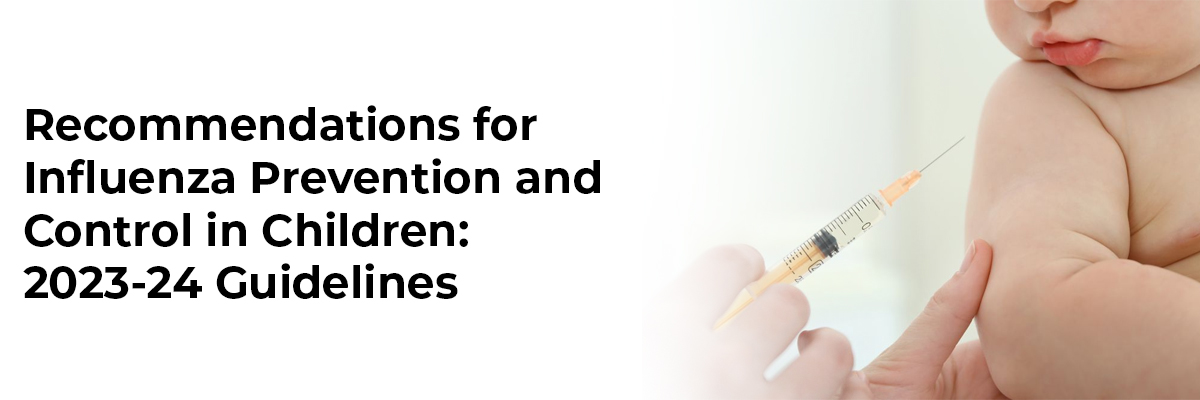
 IJCP Editorial Team
IJCP Editorial Team
Recommendations for Influenza Prevention and Control in Children: 2023-24 Guidelines
Updates for 2023–2024 Influenza Season and The American Academy of Pediatrics (AAP) Recommendations:
Composition of Influenza Vaccines has been updated:
- A new influenza A (H1N1) pdm09 component is recommended for the 2023-24 season.
- Influenza A (H3N2), influenza B Yamagata lineage, and influenza B Victoria lineage components remain unchanged from the previous season.
Influenza Vaccine Recommendations:
- Vaccination for everyone aged 6 months and older is essential.
- There is no preference for a specific vaccine; options include – inactivated influenza vaccine (IIV), live attenuated influenza vaccine (LAIV), and recombinant influenza vaccine (RIV).
- The live-attenuated influenza vaccine (LAIV) is not recommended for immunocompromised persons or those with certain chronic conditions.
- Dosing depends on age and vaccination history; children 6 months to 8 years may need two doses if receiving the vaccine for the first time or if the vaccination history is unclear.
- Administration should ideally be completed by the end of October for optimal protection.
- IIV (or RIV) can be administered simultaneously with other vaccines; LAIV can be given simultaneously with live or inactivated vaccines, including COVID-19 vaccines.
Special Considerations for Specific Groups:
- Children with malignant neoplasms – optimal time for IIV administration not well defined.
- Children on anti-B cell therapies – IIV deferred until B cell recovery.
- Hematopoietic stem cell recipients – IIV can be given 4-6 months post-transplantation.
- Pregnant individuals – can receive IIV at any time during pregnancy.
- Travelers to specific regions – consider influenza vaccination ≥2 weeks before departure.
Recommendations to Improve Vaccine Access:
- Efforts to eliminate disparities in vaccine supply.
- Promoting vaccination in schools, pharmacies, and nontraditional settings.
- Encouraging vaccination in the medical home for comprehensive care.
- Practices serving children may consider offering influenza vaccine to family members and close contacts.
AAP's Support for Mandatory Influenza Vaccination:
- Encourages mandatory influenza vaccination for health care personnel.
Influenza Vaccine Contraindications and Precautions:
- Product-specific contraindications should be considered.
- Severe allergic reaction history may be a contraindication; evaluation by an allergist is recommended.
- Children with egg allergy can receive any influenza vaccine without additional precautions.
- Vaccination for children with acute moderate or severe illness, including COVID-19, can proceed when their condition improves.
- Influenza Testing:
- Testing is recommended for children with influenza signs and symptoms when results impact clinical management.
- Molecular assay is recommended for hospitalized patients during influenza circulation.
- At-home tests are available for children as young as 2 years; use is informed by test characteristics and individual factors.
- Influenza Treatment Recommendations:
- Antiviral medications (especially oseltamivir) are important for treatment and prophylaxis.
- Treatment should start as early as possible for hospitalized children, severe cases, and those at high risk for complications.
- Outpatient treatment may be considered for non-high-risk children within 48 hours of symptom onset.
- Chemoprophylaxis is advised for high-risk children exposed to influenza.
The AAP emphasizes updated influenza vaccine recommendations, accessibility, and special considerations for diverse populations, supporting the importance of timely vaccination and antiviral treatment for effective influenza control in children.
Source: O’Leary ST, Campbell JD, Ardura MI, Banerjee R, Bryant KA, Caserta MT, Frenck RW, Gerber JS, John CC, Kourtis AP, Myers A. Pediatrics. 2023;152(4).

IJCP Editorial Team
Comprising seasoned professionals and experts from the medical field, the IJCP editorial team is dedicated to delivering timely and accurate content and thriving to provide attention-grabbing information for the readers. What sets them apart are their diverse expertise, spanning academia, research, and clinical practice, and their dedication to upholding the highest standards of quality and integrity. With a wealth of experience and a commitment to excellence, the IJCP editorial team strives to provide valuable perspectives, the latest trends, and in-depth analyses across various medical domains, all in a way that keeps you interested and engaged.





















Please login to comment on this article